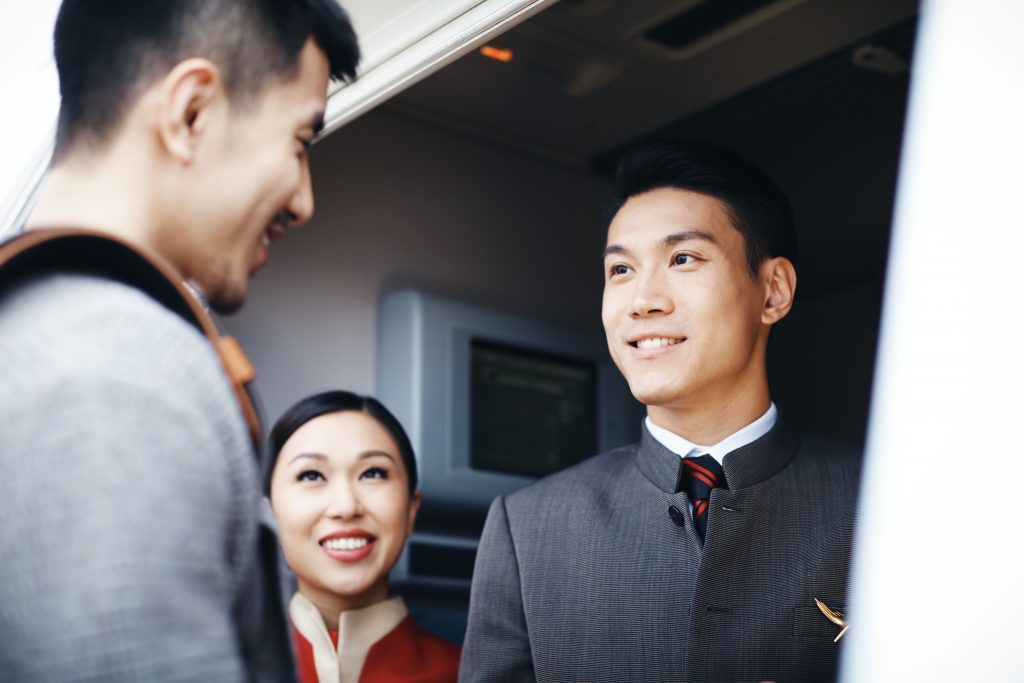
Cathay Pacific flight attendants have warned of potentially “catastrophic” consequences should they not be allowed to wear disposable surgical facemasks designed to protect them from airborne viruses. Flight attendants at the Hong Kong-based airline have spoken out and demanded the right to wear facemasks on all flights following the news that a new SARS-like coronavirus that originated in Wuhan can be passed from human-to-human.
Until recently, Chinese authorities had insisted the virus, which causes symptoms similar to a bad flu or pneumonia, had not been transmitted between humans and that all the known cases seemed to be linked to a now-closed animal and fish market in the central Chinese city.

Up to 15 healthcare workers in one hospital in Wuhan have been infected after coming into contact with a patient who had the coronavirus and some are now said to be in a serious condition. The potential for human-to-human transmission is believed to be a lot easier than experts had previously thought.
The news emerged as the death toll from the virus leapt to six and cases were confirmed in Thailand, Japan, South Korea, Taiwan and the United Stestes as well as in Beijing, Shanghai and Guangdong Province on the Chinese mainland. At least 309 people are known to have been infected, while some British experts believe the figure is much higher, estimating around 1,400 people based on the rapid spread of the virus.
The World Health Organisation (WHO) is set to hold an emergency meeting on Wednesday to decide whether to impose travel restrictions. At present, both the WHO and the International Air Transport Association (IATA) do not recommend any restriction on either travel or trade, including to Wuhan which is the epicentre of the outbreak.
But in a memo sent to Cathay Pacific executives, the flight attendants union said they had “received a tremendous amount of emails and messages from our members expressing their concerns and anxiety towards the pneumonia…”
“All of them are worried about the risk they are taking every time they go to work. It is time for the Company to properly address their concerns and allow Cabin Crew to wear masks on all flights.”
In response to the outbreak, Cathay Pacific had given flight attendants the option of wearing surgical face masks on flights to and from Wuhan but had not extended that permission to any other flight. [UPDATE: Cathay Pacific has now extended permission to wear face masks on all flights to and from mainland China]
A spokesperson for the airline told us at the time that crew could wear face masks at their “discretion” but only during flights to Wuhan. Telling us that they were “monitoring the situation closely”, the spokesperson continued:
“Our frontline staff are reminded to maintain good personal and environmental hygiene and to remain alert and vigilant while being on the lookout for passengers presenting with infectious disease symptoms.”
“We have in place ‘Suspected Infectious Disease Procedures and Guidelines’, which are based on the guidelines of the World Health Organization and the International Air Transport Association.”
The precautions echo that of the Hong Kong government who do not currently advise the wearing of surgical facemasks, despite them being popular in the region and commonly worn by Cathay’s ground staff who do not have the same restrictions as cabin crew.
“It will be too late and too painful for all of us and the Company (Cathay Pacific) to wait until one of our own is infected,” the memo from the flight attendants association warns.
“The damage caused will be catastrophic. We hereby urge the Company to put their employees’ and passengers’ health as a top priority and allow all Cabin Crew to wear masks inflight.”
Authorities at Hong Kong international airport have stepped monitoring of passengers coming from mainland China, as have health officials in a number of countries in the region, as well as in Australia and the United States.
Mateusz Maszczynski honed his skills as an international flight attendant at the most prominent airline in the Middle East and has been flying ever since... most recently for a well known European airline. Matt is passionate about the aviation industry and has become an expert in passenger experience and human-centric stories. Always keeping an ear close to the ground, Matt's industry insights, analysis and news coverage is frequently relied upon by some of the biggest names in journalism.







